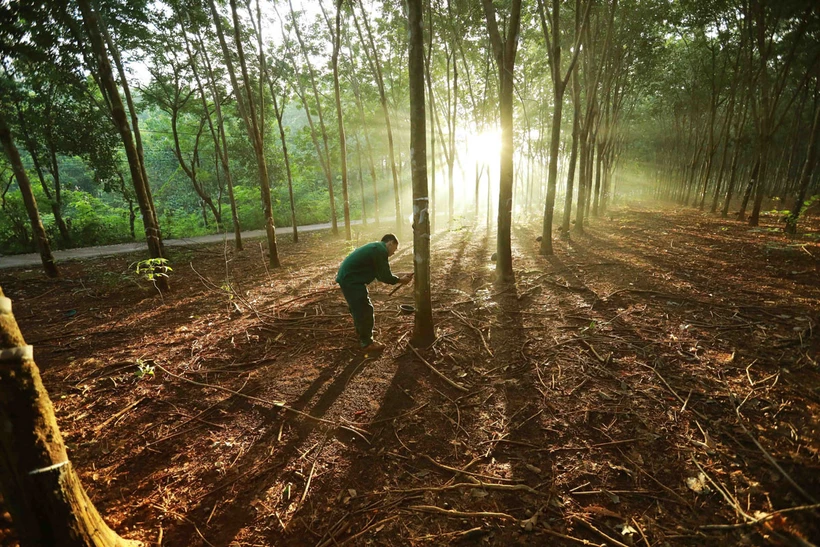 |
| A worker extracts rubber latex in the Dong Phu rubber plantation of the Vietnam Rubber Group. Rubber is among the commodities targeted by the EUDR. (Photo: VNA) |
The Vietnam Trade Promotion Agency under the Ministry of Industry and Trade (MoIT) noted that under the regulation on deforestation-free supply chains, issued in June 2023, the EU will not import or consume the products and goods coming from deforestation or forest degradation. Businesses must prove that their products are not from land deforested or subject to forest degradation after December 31, 2020.
The EUDR targets the commodities with a major impact on deforestation such as coffee, cocoa, soybean, palm oil, cattle, timber and wood products, and rubber. Among them, Vietnam has three considerably affected by this regulation, namely timber, rubber, and coffee, which enjoy over 2.5 billion USD in export revenue to the EU.
Hoang Thanh, a representative of the EU Delegation to Vietnam, noted the EUDR will be applied to large enterprises from December 31, 2024, and to small and medium ones (SMEs) from June 30, 2025. Only the products meeting both the conditions of non-deforestation and legality can enter the EU market or be exported from the EU.
Mentioning challenges from the EUDR, Dinh Sy Minh Lang, a representative of the MoIT’s European-American Market Department, said origin tracing and EUDR certification procedures may inflate export costs, posing risks to SMEs. Vietnamese goods will encounter great competition as rivals have better preparedness for EUDR compliance.
The difficulty in identifying legal farming zones will affect the results of assessing and classifying country- and production zone-based risks. The control of input materials in coffee, timber, and rubber supply chains is relatively hard due to multiple layers of traders, he pointed out.
Experts held that as the time for implementing the EUDR and many other stringent rules of the EU is approaching, enterprises should act immediately to adjust their production activities. Adherence to the EUDR will generate numerous opportunities for enterprises, including improving their competitiveness since those with sustainable supply chains and quality material sources are priorities of European partners.
Thanh went on to say that the EU will assist Southeast Asian countries, including Vietnam, in building capacity, raising awareness, and sharing information about EUDR requirements.
The Vietnam Rubber Association proposed the Ministry of Agriculture and Rural Development issue technical guidance for the target sectors so that they can make timely response plans. It also suggested State agencies devise measures for supporting businesses to adapt to the EUDR, especially in terms of positioning data and origin tracing.
Echoing the view, Assoc. Prof. Dr Nguyen Thuong Lang from the National Economics University perceived that authorities should give more detailed instructions to enterprises, open a support website, or establish groups of related companies and parties to provide updates on the EUDR and other green standards of the EU.
It is also necessary to issue detailed policies and guidance, set up a question-and-answer unit to quickly meet information demand, and conduct surveys to assess their capacity to give appropriate assistance, he added./.